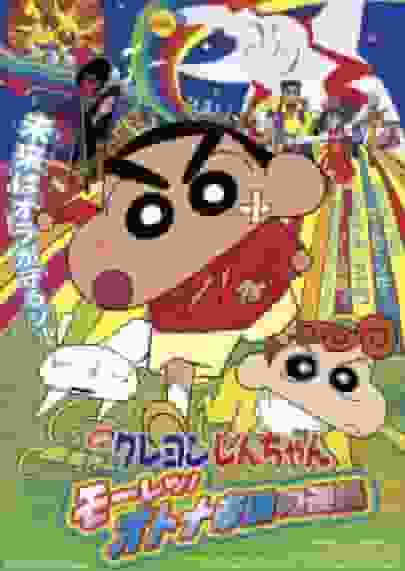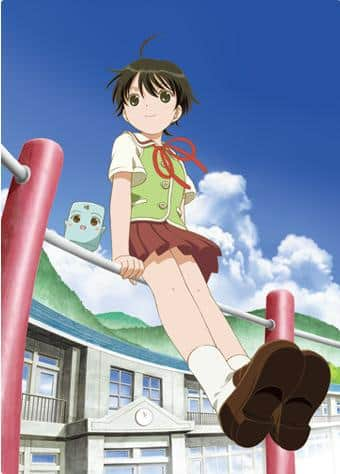Crayon Shin-chan: Storm Called: The Adult Empire - Movie Review: A masterpiece anime that can be enjoyed by both children and adults

Crayon Shin-chan: Storm Called: The Adult Empire's Appeal and EvaluationCrayon Shin-chan: Storm Called: Bodacious Adult Empire is the ninth film in the Crayon Shin-chan series, released in 2001. Based on the manga by Yoshito Usui, the film was directed and written by Keiichi Hara and produced by Shin-Ei Animation, TV Asahi and ASATSU-DK. It was released on April 21, 2001 and distributed by Toho. It is made up of one 89-minute episode, and can be enjoyed by both children and adults. storyOne day, a theme park called "20th Century Expo" suddenly opened in Kasukabe. This theme park recreates old TV shows, movies, and everyday life, and is a big hit with adults as an amusement park where you can immerse yourself in a nostalgic world. However, children such as Shinnosuke find it not interesting at all. Shinnosuke and his friends are confused when they see adults going there every day, engrossed in the experience. In fact, this "20th Century Expo" was part of a terrifying plan to create an "Adult" empire, led by a group led by "Ken-chan and Chaco-chan," by creating a fun world for adults only and stopping time. Hiroshi stops going to work, Misae stops doing housework, and Shinnosuke ends up looking after Himawari. Eventually, the adults leave for "20th Century Expo" and never come back. Feeling a sense of crisis that they will lose their future if things continue like this, Shinnosuke and the other members of the "Kasukabe Defense Force" decide to enter "20th Century Expo" to bring the adults back. However, when they get there, they find their parents, who have reverted to being children again, playing happily. Will the Kasukabe Defense Force be able to defeat Ken-chan and Chaco-chan? And will Shinnosuke be able to bring the adults back to the present world and protect the future? This work unfolds with these questions in mind. castThe cast of this work includes voice actors who have continued from the TV series, such as Akiko Yajima as Shinnosuke Nohara, Miki Narahashi as Misae Nohara, Keiji Fujiwara as Hiroshi Nohara, and Satomi Koorogi as Himawari Nohara. In addition, voice actors who play unique characters such as Mari Mashiba as Tooru Kazama and Shiro, Tamao Hayashi as Nene Sakurada, Sadatomo Ichiryusai as Masao Sato, Chie Sato as Bo-chan, and Ai Kobayashi as Chako are also lined up. In addition, the supporting cast is also solid, including Rokuro Naya as the head teacher, Yuko Mita as Hiroshi (childhood), Ginzo Matsuo as Ginnosuke Nohara, and Tomoe Kitagawa as Tsuru Nohara. Main StaffThe film is directed and written by Hara Keiichi, with Hara Katsunori, Tsutsumi Noriyuki, and Mamada Masuo as animation directors. The art directors are Koga Toru and Shimizu Toshiyuki, and the character designs are Sueyoshi Yuichiro and Hara Katsunori. The cinematographer is Umeda Toshiyuki, the clay animation is by Ishida Takuya, and the music is by Arakawa Toshiyuki and Hamaguchi Shiro. The sound director is Okuma Akira, the editor is Okayasu Hajime, and the chief producers are Mogi Hitoshi, Ota Kenji, and Ikuta Hidetaka. The storyboards are by Hara Keiichi and Mizushima Tsutomu, the direction is by Mizushima Tsutomu, the color design is by Nonaka Sachiko, the animation check is by Obara Kenji, and the assistant director is Park Kyungsoon. Many staff members participated in the key animation, including Yuichiro Sueyoshi, Masami Otsuka, Yoshihiko Takakura, Masahiro Sato, Mamoru Hoshino, Kinuko Izumi, Hidetoshi Owase, Shizuka Hayashi, Masahiko Matsuyama, Daiji Suzuki, Tadakatsu Yoshida, Makiko Shinohara, Yoshihiro Matsushita, Tomoyuki Matsumoto, Okubo Osamu, Kenichi Shimizu, Iwao Shigeto, Hitomi Tsunobari, Katsunori Hara, Mamada Masuo, Kyoto Animation, Animation Do, Jungle Jim, Tezuka Productions, etc. Animation was done by Jungle Jim, Kyoto Animation, Animation Do, Tezuka Productions, Shin-Ei Animation, Yumegenkan, M.I., Studio Zaendo, Studio Dub, MSJ, Madhouse, and Studio Mates, and finishing was done by Kyoto Animation, Office Yu, Lightfoot, M.I., Studio Road, Madhouse, Trace Studio M, and Beijing Sharaku Art Products Co., Ltd. Special effects were handled by Maekawa Takashi, backgrounds by Studio Uni and Atelier Roku, photography by Anime Film, CGI by Tsutsumi Noriyuki, ending composition by Kashiwabara Kenji. Sound production was by Audio Planning You, sound production desk by Kato Tomomi and Yamaguchi Sayaka, sound production assistants by Suzuki Noriko and Izawa Motoi, recording studio by APU Studio, mixers by Tanaka Akiyoshi and Oshiro Hisanori, assistant mixers by Taguchi Nobutaka, Uchiyama Takaaki, Yamamoto Hisashi, Kaneko Toshiya, and Tsuji Makoto, sound effects by Matsuda Akihiko and Harada Atsushi (Fizz Sound Creation), sound assistant by Washio Kentaro, music cooperation by Imagine and Saito Yuji, score mixer by Nakamura Mitsutoki, editing by Ko The directors were Shima Toshihiko, Nakaba Yumiko, Murai Hideaki, Kawasaki Akihiro, Miyake Yoshitaka, titling was by Michikawa Akira, development was by Tokyo Development Laboratory, technical cooperation was provided by Mori Mikio and Kawahigashi Tsutomu, digital optical sound was by Nishio Noboru, cooperation was provided by the Japan World Exposition Memorial Association, producers were Yamakawa Junichi and Wada Yasushi (Shin-Ei Animation), Fukuyoshi Ken (TV Asahi), production desk was Takahashi Wataru and Kaisei Satoshi, production assistants were Nishikawa Akihiko, Takahashi Reina, Kino Yu, Hirokawa Koji, and production was handled by Shin-Ei Animation, TV Asahi and ASATSU-DK. Related TitlesThis film is deeply connected to the Crayon Shin-chan TV series. The TV series depicts the daily life of Shinnosuke, his family and friends, while the film will develop a larger-scale story based on the TV series' worldview. Fans of the TV series will be able to enjoy new adventures and character development in the film. Theme songs and musicThe opening theme "Dame Dame no Uta" was written and composed by LADY Q, arranged by Toshiya Mori, and sung by LADY Q, Shinnosuke Nohara (Akiko Yajima), and Misae Nohara (Miki Narahashi). The ending theme "Genki de Itene" was written by Mitsuko Shiramine, composed and arranged by Motoyoshi Iwasaki, and sung by Sachiko Kobayashi. The inserted songs are "Ken and Mary ~Ai to Kaze no Youni~" (lyrics, composition, and arrangement: Nobuyuki Takahashi, sung by Buzz), "Shiroi Iro wa Koibito no Iro" (lyrics: Osamu Kitayama, composition: Kazuhiko Kato, arrangement: Akito Wakatsuki, sung by Betsy & Chris), "Sei naru Izumi" (lyrics and composition: Akira Ifukube, sung by The Peanuts), and "Kyou Made Soshite Ashita Kara" (lyrics and composition: Takuro Yoshida, sung by Takuro Yoshida). These songs are used effectively as the story progresses, enhancing the atmosphere of the work. Evaluation and Appeal"Crayon Shin-chan: Storm Called: The Adult Empire" has been highly praised as an entertainment piece that can be enjoyed by both children and adults. In particular, the setting of the "20th Century Expo," themed on nostalgic 20th century culture, evokes nostalgia for adults from that time and provides fresh surprises for children. In addition, the struggles of Shinnosuke and his friends to regain their adulthood portray the importance of family love and friendship, and there are many touching scenes. The appeal of this film lies above all in its humor and message. Shinnosuke's innocent actions and words inspire sympathy among children and laughter among adults. In addition, through the theme of the "Adult Empire Plan," the film contains a profound message that questions the problems of modern society and the importance of family ties. These elements are exquisitely blended together to create a film that moves and laughs for the audience. Recommended pointsThe reasons why we recommend this work are as follows:
Conclusion"Crayon Shin-chan: Storm Called: The Adult Empire" is a theatrical version of the Crayon Shin-chan series that is entertaining for both children and adults. The setting of the "20th Century Expo" is themed on nostalgic 20th century culture, and the story depicts Shinnosuke and his friends' adventures, family love and friendship, providing audiences with emotion and laughter. It also contains a deep message that questions the problems of modern society, making it thought-provoking. It is a perfect film to watch with the family, and is recommended not only for fans of the Crayon Shin-chan series, but also for first-time viewers. Please watch this film and feel Shinnosuke and his friends' adventures and the family bond. |
>>: The appeal and evaluation of Minimoni. Yarunodapyon!: New possibilities for idol anime
Recommend
OVERMAN KING GAINER: The appeal and evaluation of a new era of robot anime
"OVERMAN King Gainer": The story of Exo...
Pre-sale box office on the first day of the Lunar New Year exceeded 300 million, with "Detective Chinatown 3" accounting for 200 million
On the first day of the Lunar New Year this year,...
Zhang Yimou lost the Oscars: Mainland China sent Jiang Wen's "Hidden Man" to compete for the Oscars
According to foreign media reports, the Oscar off...
Evaluation and impressions of "Senyuu. Season 1": A fascinating story and a deep look into the characters
A comprehensive review and recommendation of the ...
The pictures are still top-notch! The new movie version of the famous game "Alchemy for Whom" is released for the first time
The new animated theatrical version of the popula...
The appeal and reviews of "All-purpose Vegetable NinNinMan": An anime experience not to be missed
The appeal and evaluation of "All-purpose Ve...
"Daimon TAKE2" review: What's the appeal of this sequel that depicts the world of the Yakuza?
The appeal and evaluation of "Emblem Take 2&...
'Game of Thrones' creator to guest star on 'Westworld'
David Benioff and Dan Weiss, creators of the HBO ...
"Avengers" and McDonald's may join forces to add special Avengers gifts to the meal
Recently, a netizen named Weeping Angel posted ph...
Cool black stealth suit! Spider-Man: Far From Home's new suit revealed
According to foreign media reports, at CCXP, the ...
Bandai SHF Cell Super Saiyan Son Goku Price: 3500 yen
Bandai's new SHFIGUARTS "Dragon Ball Z&q...
The appeal and reviews of "SAMURAI GIRL Real Bout High School": An action-packed coming-of-age story
"SAMURAI GIRL Real Bout High School": A...
Review of "Eden of the East": A suspenseful anime that depicts modern social issues
"Eden of the East" - A tale of mystery ...
"Maya the Bee": What is the appeal of this classic animation that can be enjoyed by children and adults alike?
The Adventures of Maya the Bee - Maya the Bee ■ P...
"Gundam Hathaway's Flash" animated film theme song MV Sawano Hiroyuki's masterpiece Möbius
The animated theatrical version of "Mobile S...









